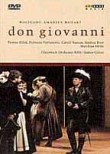March 07, 2006
Gratuitous Musickal Posting (TM)

Mozart's Don Giovanni. A production from 1991, this recording featured the following cast:
Don Giovanni - Thomas Allen
Donna Anna - Carolyn James
Donna Elvira - Carol Vaness
Don Ottavio - Kjell Magnus Sandve
Il Commentadore - Mathias Halle
Leporello - Ferruccio Ferlanetto
Zerlina - Andrea Rost
Mazetto - Reinhard Dorn
The music, which was first rate, was performed by the Gurzenich Orchester Cologne and the Choir of Cologne City Opera, under the direction of James Conlon. On the other hand, the soloists for the most part left me quite flat.
Don Giovanni is, in my humble opinion, one of the greatest operas ever written, if not the greatest. (Here is a history and synopsis of the piece.) One of its strengths is that it is so, shall I say, life-like. Most late 18th Century opera came in one of two forms, opera seria (tragic or serious) and opera buffa (comic), with attendant stock characters and formulaic attitudes and behavior. One of Don Giovanni's greatest strengths is that it can't really be classified as either one, borrowing freely from both. This has the effect of making the characters much more realistic and giving room for all sorts of psychological subtlety, a phenomenon Mozart took full advantage of. It's too bad that this production did not.
Allen, who has been around a long time, had occassional moments of power and sauvity as the Don, but much of the time he looked rather like Dracula (owing to a rayther sever toupe) with the runs. Zerlina is an opportunistic minx, but Andrea Rost played her soft and gentle. There was no chemistry whatsoever in the scene where Giovanni seduced her, nor was there any evidence of her manipulative nature when she beguiled Masetto into taking her back. Nor was I really impressed with either of the two leading ladies. Both James' Anna and Vaness' Elvira were given to shrieking. Also, as Giovanni himself notes, Elvira really is somewhat crazy, still pursuing the Don even after she knows the full truth about him. This makes the pathos when he pretends to seduce her again (via a disguised Leporello) and her humiliation when the disguise is discovered even keener. But I didn't really get much sense of this from this production. Finally, I know that Ottavio is one of the most thankless parts in the repertoire, but really, Sandve didn't need to sing it with the same scowl on his face the entire time.
On the brighter side, Halle was fine as the Commendatore, although he got short-changed in Act Two because the Statue remained frozen on its pedestal all the way through (even when it showed up for dinner!). Dorn's Masetto was a good hot-headed country bumpkin, easily turned by everybody around him. And last but not least, Ferlanetto's Leporello was probably my favorite of the piece, world-wary and calculating.
As for other things, the staging was simple and generally okay, primarily consisting of sillouetted buildings in and about Seville. (The stage must have been hot as hell, however, because everyone seemed to start sweating very quickly.) As to choreography, the masquerade at the end of Act I was very well done. However, the climax of the opera was truly bizarre. As I mentioned earlier, when the statue of the Commendatore appeared at Giovanni's palace, he was still frozen on his pedestal. No "Ta! Ta! Ta! Ta!" No movement whatsoever, apart from his mouth. And when he intoned "Dammi la mano in pegno!", Giovanni had to climb up to reach his hand. Furthermore, there were no demons - the chorus sang from off-stage. So how did Giovanni get carted off to hell? Well, the producers simply did some funky post-production light trick with the camera to blot out the image of him still wrestling with the statue. (This production was made for film, not a live audience.) The effect was, well, lame.
Two final production notes. First, I didn't think much of the subtitles. As I say, this is a far more complex and subtle opera than many and the language is extremely important - any number of passages were heavily edited in a manner that diluted their meanings. Second, it seemed that there was only one microphone for the singers, way down stage and to one side. I kept having to fiddle with the volume depending on where they were standing. Also, the balance was off - sometimes I could barely hear them over the orchestra, sometimes they drowned it right out.
So there you have it. My recommendation? Don't bother. I'm sure there's a better production out there somewhere.


 Image courtesy of the lovely and talented
Image courtesy of the lovely and talented 